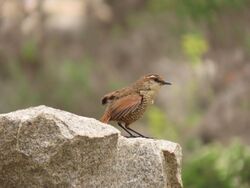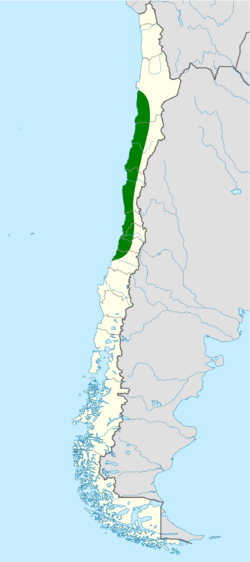Biology:White-throated tapaculo
| White-throated tapaculo | |
|---|---|

| |
| Scientific classification | |
| Domain: | Eukaryota |
| Kingdom: | Animalia |
| Phylum: | Chordata |
| Class: | Aves |
| Order: | Passeriformes |
| Family: | Rhinocryptidae |
| Genus: | Scelorchilus |
| Species: | S. albicollis
|
| Binomial name | |
| Scelorchilus albicollis (Kittlitz, 1830)
| |

| |
The white-throated tapaculo (Scelorchilus albicollis) is a species of bird in the family Rhinocryptidae. It is endemic to Chile .
Taxonomy and systematics
The white-throated tapaculo has two subspecies. The nominate Scelorchilus albicollis albicollis was described by Kittlitz in 1830. The second, S. a. atacamae, was described by Carl Eduard Hellmayr in 1924.[2]
Description
The adult of the nominate subspecies of white-throated tapaculo has a cinnamon forehead, a bold white supercilium, and gray-brown upper parts. The rump is lightly barred. The underparts are whitish darkening to pale cinnamon on the belly. Most of the underparts have dark brown bars. The subspecies S. a. atacamae is similarly colored but paler; in particular the upper parts are much more gray than brown. The juveniles are similar to the adults but barred all over. The white-throated tapaculo is approximately 19 cm (7.5 in) long.[3]
Distribution and habitat
The white-throated tapaculo is found only in Chile. Subspecies S. a. atacamae ranges from the Antofagasta Region south to the northern part of the Coquimbo Region. S. a. albicollis is found from the Coquimbo Region south to the Maule Region.[3] The more northern part of its range is characterized by xeric shrublands and the more southerly part by woodlands and scrub in a Mediterranean climate.[4] The species is usually found from sea level to 1,000 m (3,300 ft) but also up to 1,600 m (5,200 ft). It is thought to be sedentary.[3]
Behavior
Feeding
The white-throated tapaculo's diet is almost exclusively arthropods. It forages mostly on the ground in dense cover.[3]
Breeding
The white-throated tapaculo's nest is a cup made of soft grass built at the end of a tunnel up to 2 m (6.6 ft) long. Eggs are laid in September and October. Both the male and the female incubate the eggs and feed the nestlings.[3]
Vocalization
The white-throated tapaculo sings from the ground or a low perch. The typical song is a series of "barking" notes falling in pitch [1]. The call is a harsh grunt that has been compared to a pig's [2].[3]
Status
The IUCN has assessed the white-throated tapaculo as of Least Concern. It has a fairly large range that includes some protected areas. The population has not been quantified but the species is "fairly common" and their number is believed to be stable.[1][3]
References
- ↑ 1.0 1.1 BirdLife International (2016). "Scelorchilus albicollis". IUCN Red List of Threatened Species 2016: e.T22703434A93922860. doi:10.2305/IUCN.UK.2016-3.RLTS.T22703434A93922860.en. https://www.iucnredlist.org/species/22703434/93922860. Retrieved 16 November 2021.
- ↑ Gill, F.; Donsker, D.; Rasmussen, P. (January 2021). "IOC World Bird List (v 11.1)". http://www.worldbirdnames.org/.
- ↑ 3.0 3.1 3.2 3.3 3.4 3.5 3.6 Krabbe, N. and T. S. Schulenberg (2020). White-throated Tapaculo (Scelorchilus albicollis), version 1.0. In Birds of the World (J. del Hoyo, A. Elliott, J. Sargatal, D. A. Christie, and E. de Juana, Editors). Cornell Lab of Ornithology, Ithaca, NY, USA. https://doi.org/10.2173/bow.whttap1.01 retrieved April 24, 2021
- ↑ Jiménez, Héctor E. and Armesto, Juan J. (December 1992) "Importance of the Soil Seed Bank of Disturbed Sites in Chilean Matorral in Early Secondary Succession" Journal of Vegetation Science 3(5): pp. 579-586, p. 579
Wikidata ☰ Q589812 entry
 |


